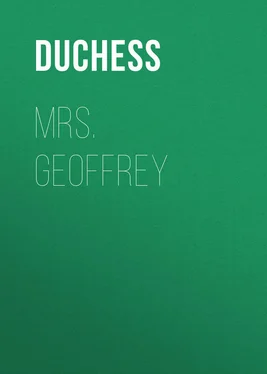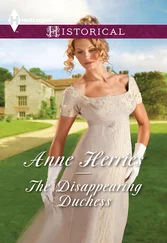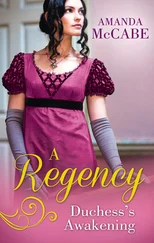Duchess - Mrs. Geoffrey
Здесь есть возможность читать онлайн «Duchess - Mrs. Geoffrey» — ознакомительный отрывок электронной книги совершенно бесплатно, а после прочтения отрывка купить полную версию. В некоторых случаях можно слушать аудио, скачать через торрент в формате fb2 и присутствует краткое содержание. Жанр: foreign_antique, foreign_prose, foreign_sf, на английском языке. Описание произведения, (предисловие) а так же отзывы посетителей доступны на портале библиотеки ЛибКат.
- Название:Mrs. Geoffrey
- Автор:
- Жанр:
- Год:неизвестен
- ISBN:нет данных
- Рейтинг книги:5 / 5. Голосов: 1
-
Избранное:Добавить в избранное
- Отзывы:
-
Ваша оценка:
- 100
- 1
- 2
- 3
- 4
- 5
Mrs. Geoffrey: краткое содержание, описание и аннотация
Предлагаем к чтению аннотацию, описание, краткое содержание или предисловие (зависит от того, что написал сам автор книги «Mrs. Geoffrey»). Если вы не нашли необходимую информацию о книге — напишите в комментариях, мы постараемся отыскать её.
Mrs. Geoffrey — читать онлайн ознакомительный отрывок
Ниже представлен текст книги, разбитый по страницам. Система сохранения места последней прочитанной страницы, позволяет с удобством читать онлайн бесплатно книгу «Mrs. Geoffrey», без необходимости каждый раз заново искать на чём Вы остановились. Поставьте закладку, и сможете в любой момент перейти на страницу, на которой закончили чтение.
Интервал:
Закладка:
"I am not going to suffer," says Mona, lightly. "Sorrow only falls on every second generation; and you know poor mother was very unhappy at one time: therefore I am free. You will call that superstition, but," with a grave shake of her head, "it is quite true."
"I hope it is," says Geoffrey; "though, taking your words for gospel, it rather puts me out in the cold. My mother seems to have had rather a good time all through, devoid of anything that might be termed trouble."
"But she lost her husband," says Mona, gently.
"Well, she did. I don't remember about that, you know. I was quite a little chap, and hustled out of sight if I said 'boo.' But of course she's got over all that, and is as jolly as a sand-boy now," says Geoffrey, gayly. (If only Lady Rodney could have heard him comparing her to a "sand-boy"!)
"Poor thing!" says Mona, sympathetically, which sympathy, by the by, is utterly misplaced, as Lady Rodney thought her husband, if anything, an old bore, and three months after his death confessed to herself that she was very glad he was no more.
"Where do you get your music?" asks Geoffrey, idly, wondering how "London Bridge" has found its way to this isolated spot, as he thinks of the shops in the pretty village near, where Molloy and Adams, and their attendant sprite called Weatherley, are unknown.
"The boys send it to me. Anything new that comes out, or anything they think will suit my voice, they post to me at once."
"The boys!" repeats he, mystified.
"Yes, the students, I mean. When with aunty in Dublin I knew ever so many of them, and they were very fond of me."
"I dare say," says Mr. Rodney, with rising ire.
"Jack Foster and Terry O'Brien write to me very often," goes on Mona, unconsciously. "And indeed they all do occasionally, at Christmas, you know, and Easter and Midsummer, just to ask me how I am, and to tell me how they have got through their exams. But it is Jack and Terry, for the most part, who send me the music."
"It is very kind of them, I'm sure," says Geoffrey, unreasonably jealous, as, could he only have seen the said Terry's shock head of red hair, his fears of rivalry would forever have been laid at rest. "But they are favored friends. You can take presents from them, and yet the other day when I asked you if you would like a little gold chain to hang to your mother's watch, you answered me 'that you did not require it' in such a tone as actually froze me and made me feel I had said something unpardonably impertinent."
"Oh, no," says Mona, shocked at this interpretation of her manner. "I did not mean all that; only I really did not require it; at least" – truthfully – "not much . And, besides, a song is not like a gold chain; and you are quite different from them; and besides, again," – growing slightly confused, yet with a last remnant of courage, – "there is no reason why you should give me anything. Shall I" – hurriedly – "sing something else for you?"
And then she sings again, some old-world song of love and chivalry that awakes within one a quick longing for a worthier life. Her sweet voice rings through the room, now glad with triumph, now sad with a "lovely melancholy," as the words and music sway her. Her voice is clear and pure and full of pathos! She seems to follow no rule; an "f" here or a "p" there, on the page before her, she heeds not, but sings only as her heart dictates.
When she has finished, Geoffrey says "thank you" in a low tone. He is thinking of the last time when some one else sang to him, and of how different the whole scene was from this. It was at the Towers, and the hour with its dying daylight, rises before him. The subdued light of the summer eve, the open window, the perfume of the drowsy flowers, the girl at the piano with her small drooping head and her perfectly trained and very pretty voice, the room, the soft silence, his mother leaning back in her crimson velvet chair, beating time to the music with her long jewelled, fingers, – all is remembered.
It was in the boudoir they were sitting, and Violet was dressed in some soft gray dress that shone and turned into palest pearl as she moved. It was his mother's boudoir, the room she most affects, with its crimson and gray coloring and its artistic arrangements, that blend so harmoniously, and are so tremendously becoming to the complexion when the blinds are lowered. How pretty Mona would look in a gray and crimson room? how —
"What are you thinking of?" asks Mona, softly, breaking in upon his soliloquy.
"Of the last time I heard any one sing," returns he, slowly. "I was comparing that singer very unfavorably with you. Your voice is so unlike what one usually hears in drawing-rooms."
He means highest praise. She accepts his words as a kind rebuke.
"Is that a compliment?" she says, wistfully. "Is it well to be unlike all the world? Yet what you say is true, no doubt. I suppose I am different from – from all the other people you know."
This is half a question; and Geoffrey, answering it from his heart, sinks even deeper into the mire.
"You are indeed," he says, in a tone so grateful that it ought to have betrayed to her his meaning. But grief and disappointment have seized upon her.
"Yes, of course," she says, dejectedly. A cloud seems to have fallen upon her happy hour. "When did you hear that – that last singer?" she asks, in a subdued voice.
"At home," returns he. He is gazing out of the window, with his hands clasped behind his back, and does not pay so much attention to her words as is his wont.
"Is your home very beautiful?" asks she, timidly, looking at him the more earnestly in that he seems rapt in contemplation of the valley that spreads itself before him.
"Yes, very beautiful," he answers, thinking of the stately oaks and aged elms and branching beeches that go so far to make up the glory of the ivied Towers.
"How paltry this country must appear in comparison with your own!" goes on the girl, longing for a contradiction, and staring at her little brown hands, the fingers of which are twining and intertwining nervously with one another, "How glad you will be to get back to your own home!"
"Yes, very glad," returns he, hardly knowing what he says. He has gone back again to his first thoughts, – his mother's boudoir, with its old china, and its choice water-colors that line the walls, and its delicate Italian statuettes. In his own home – which is situated about fourteen miles from the Towers, and which is rather out of repair through years of disuse – there are many rooms. He is busy now trying to remember them, and to decide which of them would look best decked out in crimson and gray, or blue and silver: he hardly knows which would suit her best. Perhaps, after all —
"How strange it is!" says Mona's voice, that has now a faint shade of sadness in it. "How people come and go in one's lives, like the waves of the restless sea, now breaking at one's feet, now receding, now – "
"Only to return," interrupts he, quickly. "And – to break at your feet? to break one's heart, do you mean? I do not like your simile."
"You jest," says Mona, full of calm reproach. "I mean how strangely people fall into one's lives and then out again!" She hesitates. Perhaps something in his face warns her, perhaps it is the weariness of her own voice that frightens her, but at this moment her whole expression changes, and a laugh, forced but apparently full of gayety, comes from her lips. It is very well done indeed, yet to any one but a jealous lover her eyes would betray her. The usual softness is gone from them, and only a well-suppressed grief and a pride that cannot be suppressed take its place.
"Why should they fall out again?" says Rodney, a little angrily, hearing only her careless laugh, and – man-like – ignoring stupidly the pain in her lovely eyes. "Unless people choose to forget."
Читать дальшеИнтервал:
Закладка:
Похожие книги на «Mrs. Geoffrey»
Представляем Вашему вниманию похожие книги на «Mrs. Geoffrey» списком для выбора. Мы отобрали схожую по названию и смыслу литературу в надежде предоставить читателям больше вариантов отыскать новые, интересные, ещё непрочитанные произведения.
Обсуждение, отзывы о книге «Mrs. Geoffrey» и просто собственные мнения читателей. Оставьте ваши комментарии, напишите, что Вы думаете о произведении, его смысле или главных героях. Укажите что конкретно понравилось, а что нет, и почему Вы так считаете.












